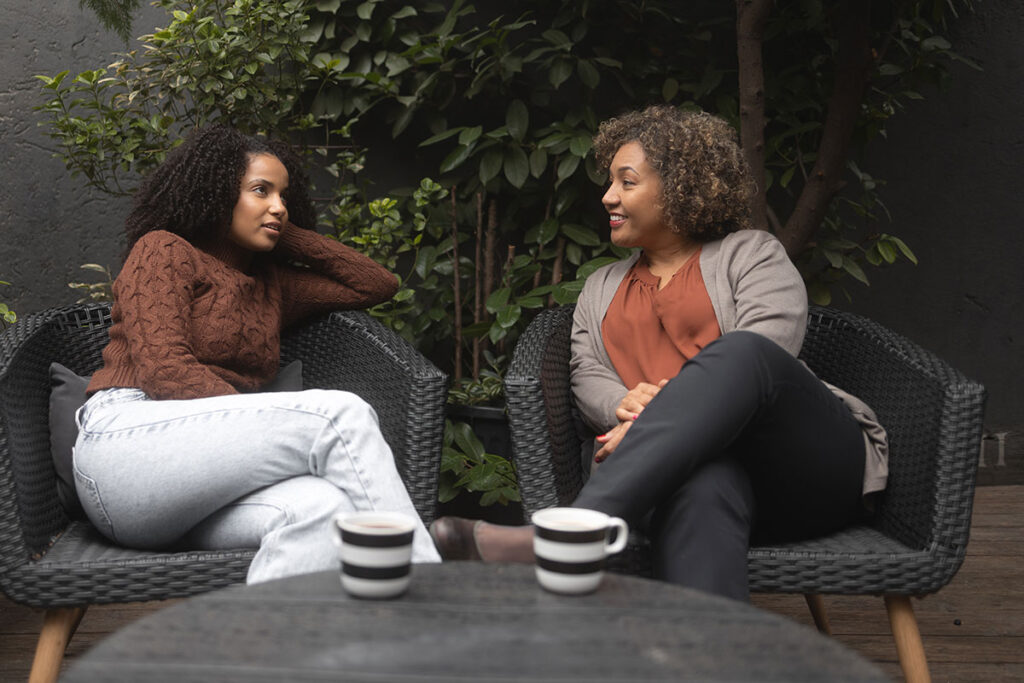Table of Contents
Overview
Peer support programs can significantly boost student well-being and belonging. In this Care Conversations episode, Seli Fakorzi shares strategies for integrating peer support into campus culture and overcoming implementation challenges.
In this episode of Care Conversations, Seli Fakorzi, Director of Mental Health, TalkNow, and Client Liaison at TimelyCare, discusses the impact of peer support on college students. Join Seli and host Sushi Suresh as they dive into strategies for how colleges and universities can support students more effectively.
Care Conversations is an audio series by TimelyCare, higher education’s most trusted virtual health and well-being provider. Each conversation offers insights from subject-matter experts on topics impacting campus health and wellness.
How can college and university leaders foster a culture of peer support?
Seli Fakorzi:
Campuses can foster peer support by making information easily accessible through events, student groups, or digital tools like QR codes. Hosting info sessions and creating resources to educate students on how to support their peers are key steps in building a proactive and informed support culture.
Sushi Suresh:
I think being easily accessible is so important to students. There’s already so much on their plates, so removing barriers can make a big difference.
What are creative ways schools have integrated peer support?
Seli Fakorzi:
Some campuses are training students to serve as peer supporters using tools like the Be There Certificate on TimelyCare’s platform. Counseling centers are also creating spaces where these peer supporters can gather, learn, and reflect together. Group training helps make the experience approachable and empowering, encouraging students to take pride in supporting their campus community.
What challenges do schools face, and how can they overcome them?
Seli Fakorzi:
A common challenge is encouraging students to take on peer support roles. Many feel uncertain or lack confidence. Schools can overcome this by offering flexible resources like the Be There Certificate, which students can complete at their own pace. Digital tools meet students where they already are—online—making it easier to engage and share support. Ultimately, normalizing peer support and keeping it manageable is key.
Sushi Suresh:
I love all of those tips. The Be There Certificate is a great digital tool, and our partnership with the Born This Way Foundation makes it even more impactful.
How can faculty and staff create safe, supportive spaces?
Seli Fakorzi:
Faculty and staff are crucial in normalizing mental health conversations. They don’t need to be therapists just active listeners who validate students’ experiences and guide them to helpful resources. By staying informed and approachable, they can be powerful allies in promoting campus wellness.
Sushi Suresh:
That resonates with me. Some of my most meaningful college experiences came from professors who normalized mental health support. It had a big impact on my journey.
How your campus can start a peer support movement
Creating a culture of peer support starts with intention and action. Whether it’s through student training programs, digital tools, or faculty engagement, small efforts can lead to a major impact.
Contact us to learn how we can help your campus thrive.
Key Takeaways
- Peer support fosters connection and mental wellness.
Accessibility and simplicity are critical to student engagement.
Faculty and staff should actively normalize mental health conversations.
Training tools like the Be There Certificate help students feel confident in supporting peers.
Creating dedicated spaces for peer support builds community.
FAQs
It enhances belonging, reduces stigma, and empowers students to contribute to a healthy campus culture.





